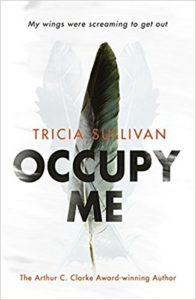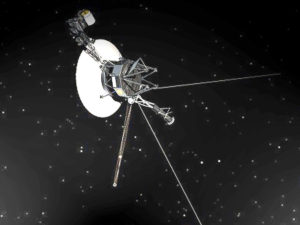
By Victoria Hoyle
Occupy Me — Tricia Sullivan (Gollancz)
‘What. The fuck. Just happened.’ (Occupy Me, 28)
 If not for my commitment to the Sharke process I wouldn’t have chosen to write about Occupy Me; it’s unlikely that I would have finished reading it at all. My immediate response was akin to a toddler presented with something green and fresh and healthy: stampy feet; scowly face; a protesting shriek of ‘I don’t like it!’. I bounced off the book hard and repeatedly, and continued to do so despite dosing myself with Gareth’s blazingly positive review and Nina and Paul’s balanced perspectives at the midway point. Whatever the book’s thematic qualities, whatever its madcap quirks – and often because of them – I couldn’t stomach it. I find it impossible to see or be fair to the better parts of the novel because I’m painfully fixated on the fundamental ways in which it fails for me. Under usual circumstances I would think it ill advised to throw a hat into the critical ring when I have so little critical perspective to share but I will try to explain.
If not for my commitment to the Sharke process I wouldn’t have chosen to write about Occupy Me; it’s unlikely that I would have finished reading it at all. My immediate response was akin to a toddler presented with something green and fresh and healthy: stampy feet; scowly face; a protesting shriek of ‘I don’t like it!’. I bounced off the book hard and repeatedly, and continued to do so despite dosing myself with Gareth’s blazingly positive review and Nina and Paul’s balanced perspectives at the midway point. Whatever the book’s thematic qualities, whatever its madcap quirks – and often because of them – I couldn’t stomach it. I find it impossible to see or be fair to the better parts of the novel because I’m painfully fixated on the fundamental ways in which it fails for me. Under usual circumstances I would think it ill advised to throw a hat into the critical ring when I have so little critical perspective to share but I will try to explain.
Firstly, the writing. This is my first encounter with Sullivan, and so I’m unequipped to compare the styling of Occupy Me to her earlier work, but here she writes on the very edge of prose sanity. Paragraphs and sentences begin soundly, rise to a peak and then tip into senselessness, with a kind of raw enthusiasm that is forgivable in a first draft but bizarre in a finished novel. Take this example from early in the book:
A curious sound begins. It seems to originate in your bones. You feel your heart going dubstep. Your awareness divides like an embryo increasing its own provenance from within. (14)
I’m with Sullivan all the way to dubstep – dubstep is a strong sensory touch – but after that I’m lost. Whether you like the self-conscious writerly tone or not, in what useful way does the fourth sentence convey the character’s experience of divided awareness? How does the biological mechanism of cell division in an embryo (presumably what Sullivan means by ‘increasing its own provenance from within’) relate to something consciously felt by an adult? An ornate simile should at least mean something and this one doesn’t.
Another different example, from much later:
You dream you’re in the garden with your wife and daughters. You’re planting vegetables. And he’s there, on the ground. All cut open, so that his guts are spread out but he’s still alive. You’re sowing unusual seeds in his body. The old man will lie on the ground, his flesh bursting with these potentials. He will be in agony as they curl and dive through him, consuming his resources, ending his ego’s hegemony over mute flesh. His mutinied cells will talk back to him in many languages across worlds and times, and there is nothing he can do about it and you feel so happy… First do no harm. And you will break your oath like breaking the sound barrier. You will hear nothing of his cries. Nothing but blue sky when he is gone. (161)
This begins pitch perfect; especially the sinister restraint of the opening gambit. The wrongness of the disembowelled corpse intruding on the idyllic family scene in the garden is dreamlike but restrained. The seed planting is sinister. But then Sullivan drops the reins and gives the horse its head. I think I know what is meant by ‘ending his ego’s hegemony over mute flesh’, although the construction is so baroque as to obscure the power of what is happening, but ‘you will break your oath like breaking the sound barrier’? What does that imply? At great speed? Noisily? With a force that sends shock waves? The latter presumably, but it’s the kind of writing that gives continual pause in the hunt for clarity, and not in a satisfyingly chewy way. The rhythm, alternating between plain short declaratives and long opaque sentences, seems designed to highlight Meaning with a capital m. We’re pushed through one prose climax after another, often dependent on the uplift of quasi-spiritual rhetoric. I’m not opposed to the sensation or the technique used sparingly and done well – Tidhar does it beautifully at the end of Central Station, for example – but Occupy Me is awash in it. It gets worse as the plot pushes towards its final revelations about time, space and memory. By the time I got to ‘There are new bullet holes in me and they are leaking allusions to the tracery of the Immanence so pristine in my Cretaceous flesh’ (257) I was in shut-down mode.
My second issue is a macro manifestation of the first. The novel’s discordant extravagant shifts in prose are mirrored by similar shifts in the plot and the presentation of the characters. The novel opens with a piece of puzzling found documentation – ‘HD waveform launcher instructions’ – and thrusts us into the body of Kisi Sorle, a doctor watching over a dying billionaire for reasons that are unclear. The doctor has been experiencing strange lapses in memory and stretches of missing time. He has just woken up to find himself in possession of a mysteriously heavy briefcase and the lingering sensation that he has taken it from someone. Things go from bad to worse when he finds his body possessed by an alter ego who murders his employer and several other people. The scene is set for a slow-burn SF thriller when Kisi goes on the run, briefcase in tow, determined to find out what is happening to him and why. Up to this point the story is exciting, tense and emotionally connected; afterwards, it’s atonal chaos. The measured restraint of the story is blown wide open by a high-octane sequence in which Kisi wrestles Pearl, an angel posing as an air stewardess, for the briefcase while on a commercial flight at 40,000 feet. During their altercation, the briefcase flies up and bursts through the fuselage of the plane, sucking Kisi (still clutching the case) and Pearl out and into freefall. Just as they’re about to hit the ocean, the briefcase falls open and a pterosaur flies out in a fireball.
Later, when Pearl pursues Kisi to Edinburgh and finds a house he has visited ransacked and a woman missing, possibly kidnapped or murdered, she focuses her energy not on solving the mystery but on taking the woman’s sick cat to the vet. The cat is sick because it has eaten the corpse of a poisonous prehistoric frog that came out of the briefcase. The vet turns out to be an open-minded whisky-loving Scot who takes this possibility in her stride and quickly becomes involved in Kisi and Pearl’s game of cat and mouse. The possibility of kidnap and murder is treated only superficially. Although Pearl verbalises concern about the woman’s fate, her actions suggest absolutely no urgency whatsoever. She even finds time to walk the woman’s two dogs. Alison the vet is similarly unperturbed. In less than one hundred paces we’ve gone from The Bourne Identity to Snakes on a Plane to a level of peril not unfamiliar to readers of cosy crime. The SFX reviewer called it ‘a psychedelic experience’ and it certainly does have the characteristics of a bad trip. The frantic build-up of tension followed by its cutesy dissolution is frankly bizarre.
I’m equally troubled by how each quirky or exciting plot twist in the novel happens in a vacuum without due regard for the realities of the people involved. Given that the book is supposedly (though barely) about a Resistance movement that effects world change through small positive actions the lack of attention to negative impacts is a shocking blind-spot. I found myself collecting moments when the plot caused injury or harm, or suggested injury or harm might be caused, and then blithely moved on without considering the ramifications. The people Kisi’s alter-ego shoots in the opening scenes are left dying on the floor. We don’t find out what happens to them, and as far as I recall he is never given an opportunity to express his remorse or the fallout from a traumatic, life altering event.
Meanwhile his family, who are presumably worried sick and exposed to the world’s media, spend the whole of the novel in limbo at his in-law’s house, a magically safe place. He doesn’t attempt to contact them throughout the whole affair. There are also a surfeit of unlikely shadow figures that are necessary to make the book work. For example, the plot pivots on Alison the vet’s network of friends and family who are able, amongst other things, to take over her business at a moment’s notice, lend her the use of an aircraft hangar and wrangle her onto a North Sea oil rig where hostages are being held by an evil corporation.
It strikes me that all of the issues I have with Occupy Me arise from its irrepressible devotion to ideas at the cost of sense and human considerations. It is a giddy free flow of concept, with dinosaurs and a whisky drinking vet thrown in for larks, the kind of book that, for once, fits the publicists’ stock phrasings: ‘startlingly original’, ‘a rollercoaster ride’, ‘a rip-roaring thriller’. I could possibly excuse the over excitable prose craft, and even the stomach-dropping changes in tone, if it weren’t for the rough way it dismisses broader human experience from its pages. The book burns up people and scenarios in a way that works against the very ethos of human generosity and individual kindness that it stands for. You could chalk it up to silly fun, but if Sullivan is asking us to take seriously the central themes of the novel and suspend disbelief about quantum angels then we need something concrete and believable to work from. I have fading patience with novels that diminish their created world in this way.
*
Victoria Hoyle is an archivist, blogger and part-time PhD student. She lives with her partner and a dog called Juno in rural North Yorkshire in the UK.
>> Read Victoria’s introduction and shortlist.


